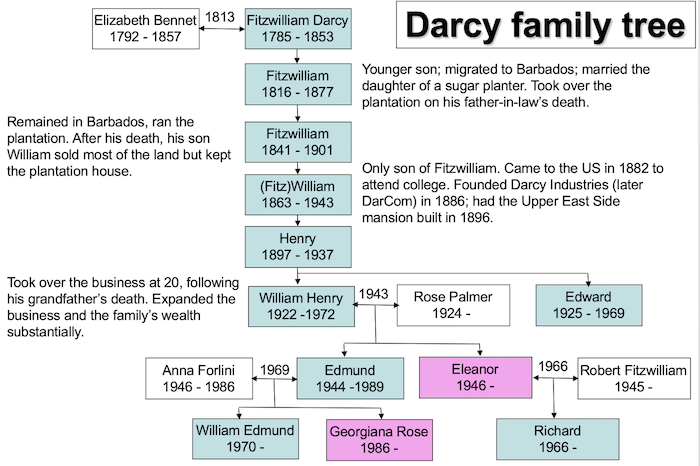William’s Health and Family Tree
Important Advice
Don’t read this until you’ve finished Chapter 50, as it includes spoilers, especially from Part 1 of the story. Also, don’t bother reading this if you aren’t interested in why I made some of the plot choices. Nothing here is relevant to understanding the story; it’s just a look behind the scenes, where some serendipity made everything fall into place.
You read the Important Advice, right?
Okay, you’ve been warned.
Very early in my planning, I decided that for this particular Darcy to develop a strong relationship with Elizabeth, it would be necessary to temporarily take him away from his rather restrictive home life, and also to eliminate the extreme travel requirements of his career. Then, later, it would be interesting to see how their relationship adapted—or didn’t—when those demands were reinstated. But why would he take a break from his career?
I immediately eliminated rehab; I didn’t want to write a story about addiction. But a health problem seemed like a good choice. And once that idea was established, the notion that he’d live somewhere else for a while seemed easy enough to arrange, allowing me to send him out to Elizabeth’s turf and thus knock him a bit off balance.
I talked this through with Linda, my first beta and the person who dared me to try to write P&P fanfic in the first place. We needed a disease or condition that wasn’t contagious, that wouldn’t disfigure him or leave him with major deficits (whether temporary or permanent), and that was serious enough to require a recovery period of at least a few months. After eliminating several options, Linda said, “Why don’t you look into congenital heart problems?”
So I did, and I found that coarctation of the aorta was a perfect fit. Although it was a congenital defect, it could recur in adulthood. These days it is usually treated without surgery, and even if surgery is required, it is done via a relatively small incision on the left side of the chest—in other words, no need to crack his chest and leave a major scar. Further, the treatment doesn’t always completely fix the symptoms; they can linger for a while and be tricky to resolve. What’s more, if untreated it can lead to further problems like left ventricular hypertrophy.
This is where it got spooky
I kept researching the condition, and I learned a little more. In the past, milder cases without obvious symptoms had often been missed. When that happened, the increased burden on the heart would gradually cause damage, often leading to death by a sudden heart attack before the individual reached his 50th birthday (I say “his” because this condition is more common in males than in females). Further, the condition appears to be hereditary, though they haven’t proven this.
From the start, I had thought it would be fun to make my Darcy a direct descendant of Jane Austen’s Darcy and Elizabeth. I had worked through the generations that would connect them together and had even built a Darcy family tree, which I have posted below. (William briefly explained his connection to Austen’s Darcy family in Chapter 27, though obviously he didn’t refer to them as “Austen’s Darcy family”). After I gave William his congenital (and hereditary) defect, I noted that in the family tree I had constructed, the men started dying in their 40s about three generations back from the current William Darcy. I have no idea why I did it, but there it was.
In addition, his having a serious childhood illness helped to explain some things I knew but didn’t understand about his mother. From the start, I had imagined her as being overprotective to an extreme, but I didn’t know why. Her estrangement from her husband offered a partial explanation—she would have clung to her son, especially since she had left her life behind in Italy when she married Edmund—but I imagined her being motivated primarily by fear, not loneliness. The family’s wealth would have shielded him from so many risks; that meant there had to be some unusual hazards causing her so much worry.
His childhood medical issues, particularly if he almost died at some point, offered a perfect reason why she might have feared losing him. His illness even explained how his talent at the piano was discovered so early. With his sheltered life, and in the near-constant company of his mother, a professional musician, he would have been exposed to plenty of music from a very young age and would probably have seen her play the piano frequently. It would have been a natural impulse for him to try to copy her.
So in the end, it felt less like I had decided to give him a congenital defect, and more like I had discovered that he had one.

